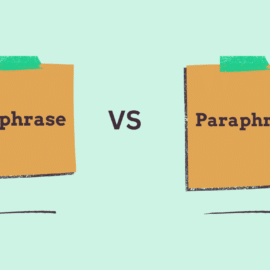
Paraphrasing is a crucial skill in both academic and professional writing. Understanding why paraphrasing is important helps improve your writing and prevent plagiarism.
Why Paraphrase?
Paraphrasing allows you to express someone else’s ideas in your own words. This demonstrates your understanding and helps improve clarity.
Benefits of Paraphrasing
Clarity and Simplicity: Paraphrasing helps make complex ideas more understandable.
Originality: It ensures your writing is unique and not just copied from sources.
Plagiarism Prevention: Proper paraphrasing helps avoid plagiarism, making your work ethical and credible.
Techniques for Effective Paraphrasing
Mastering how to paraphrase effectively involves understanding various methods and strategies.
How to Paraphrase
- Read the original text,
- Understand its meaning,
- Rewrite it in your own words without changing the original idea.
- Edit and review the paraphrased version and make sure that it reflects the original text.
Paraphrasing Methods
- Use Synonyms: Replace words with their synonyms, but ensure the meaning stays the same.
- Change Sentence Structure: Alter the sentence structure to make it unique. Learn more about this at How to Rewrite the Sentence.
Paraphrasing Strategies
- Read and Write: Read the text, then write from memory to ensure you use your own words.
- Use Quotation Marks: For phrases you can’t change, use quotation marks and cite the source.
Avoiding Plagiarism through Proper Paraphrasing
Understanding the difference between paraphrasing and plagiarism is key to maintaining integrity in your writing.
Paraphrasing vs Plagiarism
Paraphrasing involves restating ideas in your own words, while plagiarism is copying someone else’s work without credit.
Plagiarism Prevention
Effective paraphrasing is a crucial method for plagiarism prevention. Always cite sources even when paraphrasing. For more on plagiarism prevention, visit How to Avoid Plagiarism.
Paraphrasing vs Quoting
Quoting involves using the exact words from a source, enclosed in quotation marks. Paraphrasing, however, means rewriting the idea in your own words. Learn more at Paraphrase and Quotation.
Paraphrasing in Academic and Professional Writing
Paraphrasing is essential in various forms of writing, from essays to business reports.
Paraphrasing in Essays
In academic essays, paraphrasing helps present research in your own words, showcasing your understanding.
Paraphrasing in Research Papers
It ensures that your paper is original and not just a copy of existing literature.
Paraphrasing in Business Writing
In business, paraphrasing helps communicate ideas clearly and originally, avoiding legal issues related to plagiarism.
Tools and Resources for Effective Paraphrasing
Several tools and resources can help you paraphrase effectively.
Paraphrasing Tools
Online paraphrasing tools can assist in generating unique content quickly. Check out the our list of the Best Paraphrasing Tools.
The Importance of Citation in Paraphrasing
When engaging in paraphrasing, it is crucial to acknowledge the sources of the original content. Proper citation not only demonstrates academic integrity but also gives credit to the original authors and allows readers to explore the referenced material further.
For students and researchers who are rewording content, incorporating accurate citations is essential. This ensures that the borrowed ideas are appropriately attributed and avoids any accusations of plagiarism.
To learn more about the importance of citation in paraphrasing and to understand the appropriate citation styles for your academic or professional field, consult reputable style guides such as the APA, MLA, or Chicago Manual of Style. These resources offer comprehensive guidelines on how to cite sources accurately.
Remember, citing your sources not only adds credibility to your work but also fosters a responsible and ethical approach to knowledge sharing.
Other Helpful Articles:
- Paraphrasing Exercises with Answers
- Summarizing and Paraphrasing Examples
- Types of Paraphrasing
- Definition of Paraphrasing
- Synonyms and Antonyms of Paraphrasing


